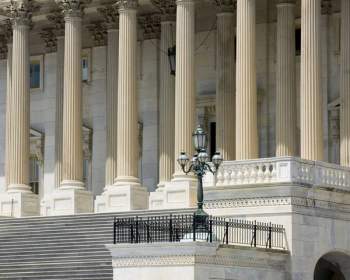
Pendleton Act Text

Popular In Employment
Kentucky Labor Laws Breaks Massachusetts Labor Laws Breaks Washington Labor Laws Breaks Michigan Labor Laws Breaks Alabama Labor Laws Breaks Employment Law Illinois Labor Laws Breaks Age Of A Cashier Preemployment Screening Fair Labor Standards Act Employment Guide Missouri Labor Laws Breaks
Duties of the Commissioners:
The Pendleton Act of 1883 required commissioners to aid the President, as he requests, in preparing regulations for carrying the merit-based system into effect. These rules were to be promulgated so that all officers of the United States can modify and carry them out.
The rules of the Pendleton Act, which were to be adhered to and carried-out by all federal employees, were as follows:
• The Pendleton Act of 1883 provided and declared a prerequisite for appointments, including the administration of competitive exams. These examinations test the applicant’s character and capacity regarding the discharge of the duties of service into which they seek. The examinations are then graded and arranged into classes based on grades.
• No individual in the public service sector is permitted to contribute to any political fund or render any political service
• No individual has the right to use his authority or influence to coerce the political environment or the action of an individual
• The Commission is responsible for constructing and subsequently regulating the examinations
• The Commission is permitted to investigate all concerning facts and may report matters surrounding the enforcement and effects of said regulations and rules
• The Commission is responsible for drafting an annual report to the President, showings its actions, its created rules and regulations and the effects thereof. Furthermore, all pending suggestions for a more effectual accomplishment shall be rendered and delivered to the President.
The Pendleton Act in its Entirety:
SEC. 2. That it shall be the duty of said commissioners:
First. To aid the President, as he may request, in preparing suitable rules for carrying this act into effect, and when said rules s1Jall have been promulgated it shall be the duty of all officers of the United States in the departments and offices to which any such rules may relate to aid, in all proper ways, in carrying said rules, and any modifications thereof; into effect.
Second. And, among other things, said rules shall provide and declare, as nearly as the conditions of good administration will warrant, as follows:
First, for open, competitive examinations for testing the fitness of applicants for the public service now classified or to be classified here- under. Such examinations shall be practical in their character, and so far as may be shall relate to those matters which will fairly test the relative capacity and fitness of the persons examined to discharge the duties of the service into which they seek to be appointed.
Second, that all the offices, places, and employments so arranged or to be arranged in classes shall be filled by selections according to grade from among those graded highest as the results of such competitive examinations.
Third, appointments to the public service aforesaid in the departments at Washington shall be apportioned among the several States and Territories and the District of Columbia upon the basis of population as ascertained at the last preceding census. Every application for an examination shall contain, among other things, a statement, under oath, setting forth his or her actual bona fide residence at the time of making the application, as well as how long he or she has been a resident of such place.
Fourth, that there shall be a period of probation before any absolute appointment or employment aforesaid.
Fifth, that no person in the public service is for that reason under any obligations to contribute to any political fund, or to render any political service, and that he will not be removed or otherwise prejudiced for refusing to do so.
Sixth, that no person in said service has any right to use his official authority or influence to coerce the political action of any person or body.
Seventh, there shall be non-competitive examinations in all proper cases before the commission, when competent persons do not compete, after notice has been given of the existence of the vacancy, under such rules as may be prescribed by the commissioners as to the manner of giving notice.
Eighth, that notice shall be given in writing by the appointing power to said commission of the persons selected for appointment or employment from among those who have been examined, of the place of residence of such persons, of the rejection of any such persons after probation, of transfers, resignations, and removals and of the date thereof, and a record of the same shall be kept. by said commission. And any necessary exceptions from said eight fundamental provisions of the rules shall be set forth in connection with such rules, and the reasons there-for shall be stated in the annual reports of the commission.
THIRD. Said commission shall, subject to the rules that may be made by the President, make regulations for, and have control of, such examinations, and, through its members or the examiners, it shall supervise and preserve the records of the same; and said commission shall keep minutes of its own proceedings.
FOURTH. Said commission may make investigations concerning the facts, and may report upon all matters touching the enforcement and effects of said rules and regulations, and concerning the action of any examiner or board of examiners hereinafter provided for, and its own subordinates, and those in the public service, in respect to the execution of this act.
FIFTH. Said commission shall make an annual report to the President for transmission to Congress, showing its own action, the rules and regulations and the exceptions thereto in force, the practical effects thereof, and any suggestions it may approve for the more effectual accomplishment of the purposes of this act.
SEC.3. That said commission is authorized to employ a chief exam- iner, a part of whose duty it shall be, under its direction, to act with the examining boards, so far as practicable, whether at Washington or elsewhere, and to secure accuracy, uniformity, and justice in all their proceedings, which shall be at all times open to him. The chief examiner shall be entitled to receive a salary at the rate of three thousand dollars a year, and he shall be paid his necessary traveling expenses incurred in the discharge of his duty The commission shall have a secretary, to be appointed by the President, who shall receive a salary of one thousand six hundred dollars per annum. It may, when necessary, employ a stenographer, and a messenger, who shall be paid, when employed, the former at the rate of one thousand six hundred dollars a year, and the latter at the rate of six hundred dollars a year. The commission shall, at Washington, and in one or more places in each State and Territory where examinations arc to take place, designate and select a suitable number of persons, not less than three, in the official service of the United States, residing in said State or Territory, after consulting the head of the department or office in which such persons serve, to be members of boards of examiners, and may at any time substitute any other person in said service living in such State or Territory in the place of anyone so selected. Such boards of examiners shall be so located as to make it reasonably convenient and inexpensive for applicants to attend before them; and where there are persons to be examined in any State or Territory, examinations shall be held therein at least twice in each year. It shall be the duty of the collector, postmaster, and other officers of the United States at any place outside of the District of Columbia where examinations are directed by the President or by said board to be held, to allow the reasonable use of the public buildings for holding such examinations, and in all proper ways to facilitate the same.
SEC. 4. That it shall be the duty of the Secretary of the Interior to cause suitable and convenient rooms and accommodations to be assigned or provided, and to be furnished, heated, and lighted, at the city of Washington, for carrying on the work of said commission and said examinations, and to cause the necessary stationery and other articles to be supplied, and the necessary printing to be done for said commission.
SEC. 5. That any said commissioner, examiner, copyist, or messenger, or any person in the public service who shall willfully and corruptly, by himself or in co-operation with one or more other persons, defeat, deceive, or obstruct any person in respect of his or her right of examination according to any such rules or regulations, or who shall willfully, corruptly, and falsely mark, grade, estimate, or report upon the examination or proper standing of any person examined hereunder, or aid in so doing, or who shall willfully and corruptly make any false representations concerning the same or concerning the person examined, or who shall willfully and corruptly furnish to any person any special or secret information for the purpose of either improving or injuring the prospects or chances of any person so examined, or to be examined, being appointed, employed, or promoted, shall for each such offense be deemed guilty of a misdemeanor, and upon conviction thereof, shall be punished by a fine of not less than one hundred dollars, nor more than one thousand dollars, or by imprisonment not less than ten days, nor more than one year, or by both such fine and imprisonment.
SEC. 6. That within sixty days after the passage of this act it shall be the duty of the Secretary of the Treasury, in as near conformity as may be to the classification of certain clerks now existing under the one hundred and sixty-third section of the Revised Statutes to arrange in classes the several clerks and persons employed by the collector, naval officer, surveyor, and appraisers, or either of them, or being in the public service, at their respective offices in each customs district where the whole number of said clerks and persons shall be all together as many as fifty. And thereafter, from time to time, on the direction of the President, said Secretary shall make the like classification or arrangement of clerks and persons so employed, in connection with any said office or offices, in any other customs district. And, upon like request, and for the purposes of this act, said Secretary shall arrange in one or more of said classes, or of existing classes, any other clerks, agents, or persons employed under his department in any said district not now classified; and every such arrangement and classification upon being made shall be reported to the President.
Second. Within said sixty days it shall be the duty of the Postmaster-General, in general conformity to said one hundred and sixty-third section, to separately arrange in classes the several clerks and persons employed, or in the public service at each post-office, or under any post- master of the United States, where the whole number of said clerks and persons shall together amount to as many as fifty. And thereafter, from time to time, on the direction of the President, it shall be the duty of the Postmaster-General to arrange in like classes the clerks and persons so employed in the postal service in connection with any other post-office; and every such arrangement and classification upon being made shall be reported to the President.
Third. That from time to time said Secretary, the Postmaster-General, and each of the heads of departments mentioned in the one hundred and fifty-eighth section of the Revised Statutes, and each head of an office, shall, on the direction of the President, and for facilitating the execution of this act, respectively revise any then existing classification or arrangement of those in their respective departments and offices, and shall, for the purposes of the examination herein provided for, include in one or more of such classes, so far as practicable, subordinate places, clerks, and officers in the public service pertaining to their respective departments not before classified for examination.
SEC. 7. That after the expiration of six months from the passage of this act no officer or clerk shall be appointed, and no person shall be employed to enter or be promoted in either of the said classes now existing, or that may be arranged hereunder pursuant to said rules, until he has passed an examination, or is shown to be specially exempted from such examination in conformity herewith. But nothing herein contained shall be construed to take from those honorably discharged from the military or naval service any preference conferred by the seventeen hundred and fifty-fourth section of the Revised Statutes, nor to take from the President any authority not inconsistent with this act conferred by the seventeen hundred and fifty-third section of said statutes; nor shall any officer not in the executive branch of the government, or any person merely employed as a laborer or workman, be required to be classified hereunder; nor, unless by direction of the Senate, shall any person who has been nominated for confirmation by the Senate be required to be classified or to pass an examination.
SEC. 8. That no person habitually using intoxicating beverages to excess shall be appointed to, or retained in, any office, appointment, or employment to which the provisions of this act are applicable.
SEC. 9. That whenever there are already two or more members of a family in the public service in the grades covered by this act, no other member of such family shall be eligible to appointment to any of said grades.
SEC. 10. That no recommendation of any person who shall apply for office or place under the provisions of this act which may be given by any Senator or member of the House of Representatives, except as to the character or residence of the applicant, shall be received or considered by any person concerned in making any examination or appointment under this act.
SEC. 11. That no Senator, or Representative, or Territorial Delegate of the Congress, or Senator, Representative, or Delegate elect, or any officer or employee of either of said houses, and no executive, judicial, military, or naval officer of the United States, and no clerk or employee of any department, branch or bureau of the executive, judicial, or military or naval service of the United States, shall, directly or indirectly, solicit or receive., or be in any manner concerned ill soliciting or receiving, any assessment, subscription, or contribution for any political purpose whatever, from any officer, clerk, or employee of the United States, or any department, branch, or bureau thereof, or from any person receiving any salary or compensation from moneys derived from the Treasury of the United States.
SEC. 12. That no person shall, in any room or building occupied in the discharge of official duties by any officer or employee of the United States mentioned in this act, or in any navy-yard, fort, or arsenal, solicit in any manner whatever, or receive any contribution of money or any other thing of value for any political purpose whatever.
SEC. 13. No officer or employee of the United States mentioned m this act shall discharge, or promote, or degrade, or in manner change the official rank or compensation of any other officer or employee, or promise or threaten so to do, for giving or withholding or neglecting to make any contribution of money or other valuable thing for any political purpose.
SEC. 14. That no officer, clerk, or other person in the service of the United States shall, directly or indirectly, give or hand over to any other officer, clerk, or person in the service of the United States, or to any Senator or Member of the House of Representatives, or Territorial Delegate, any money or other valuable thing on account of or to be applied to the promotion of any political object whatever.
SEC. 15. That any person who shall be guilty of violating any provision of the four foregoing sections shall be deemed guilty of a misdemeanor, and shall, on conviction thereof, be punished by a fine not exceeding five thousand dollars, or by imprisonment for a term not exceeding three years, or by such fine and imprisonment both, in the discretion of the court.
Approved, January sixteenth, 1883.
















